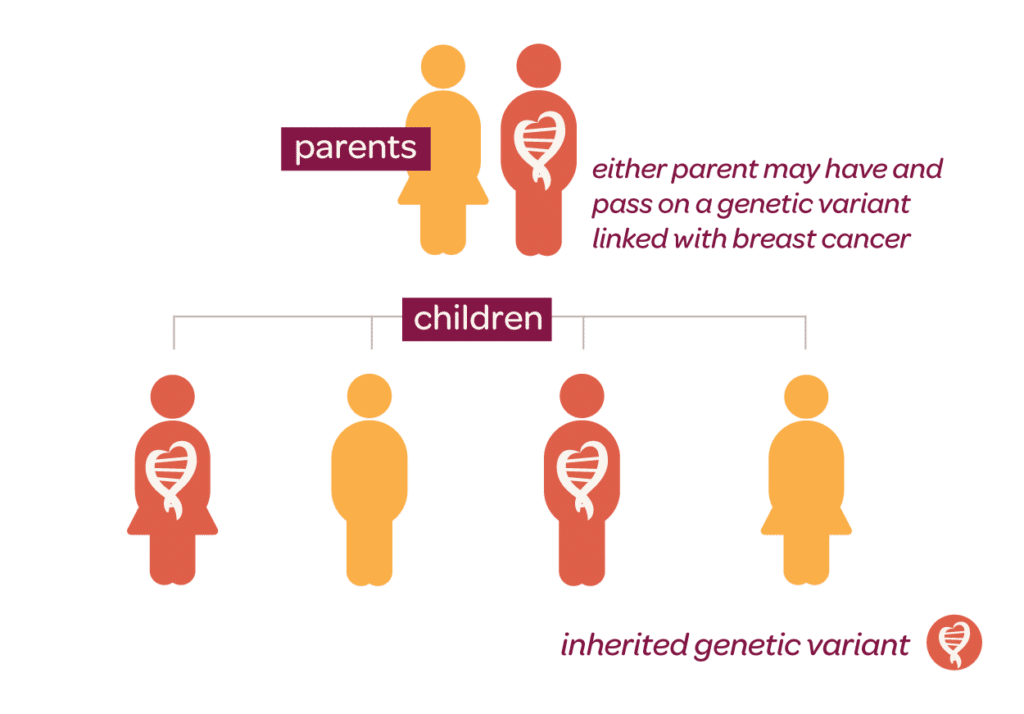Breast cancer can be caused by hereditary factors, environmental factors, or both. In this blog post, we will discuss what hereditary breast cancer is, the known genetic variants associated with it, and how to get checked if you think you may be at risk.
Understanding Hereditary Breast Cancer
People with hereditary breast cancer were born with a genetic variant linked to breast cancer. When you’re born, you inherit DNA from both biological parents, half from your mother and half from your father. Billions of cells make up your body and your DNA is in each one. When you’re born with a difference in your DNA that can lead to disease, it’s called a genetic variant or mutation.

Genetic Variants associated with Hereditary Breast Cancer
Scientists have found specific genetic variants that are associated with hereditary breast cancer. These variants can significantly increase the risk of developing breast cancer.
Genetic variants linked to hereditary breast cancer include:
- BRCA1 & BRCA21
- Found in 1 of 400 people
- Increased risk of breast cancer:
- BRCA1 is 55–72%*
- BRCA2 is 45–69%*
- While anyone can have BRCA mutations, they are found more commonly in certain groups of people, for example people of Ashkenazi Jewish descent have a 1 in 40 chance of inheriting a BRCA variant.
- The KRAS-variant2
- Found in 1 of 20 people
- Increases risk of breast cancer to 25-30%
- Other genes3
- Other genetic variants can also lead to hereditary breast cancers. They are much less common and do not increase one’s risk more than the KRAS-variant or BRCA variants. They include: ATM, PALB2, TP53, CHEK2, PTEN, CDH1, STK11.
By identifying these genetic variants, healthcare professionals can better assess a woman’s risk and suggest prevention strategies. If you have a family history of breast cancer you may want to consider undergoing genetic testing to determine if your family has one of these variants.
How to get checked for hereditary breast cancer?
You can get checked for known hereditary breast cancer with genetic testing. Most genetic testing involves a simple saliva or small blood sample, which is then analyzed for a specific genetic variant or variants associated with hereditary breast cancer. The results will help you and your healthcare provider make informed decisions about your health.
If you’re interested in learning about testing for the KRAS-variant, you can learn more here.
Prevention and Treatment Options for Hereditary Breast Cancer
When it comes to preventing cancer for women that have a genetic variant associated with hereditary breast cancer, there are several options available depending on the type of genetic variant.
One of the most effective methods for everyone is proactive screening, which involves regular mammograms and clinical breast exams to detect any changes or abnormalities in the breast tissue. For women at higher risk, additional imaging techniques such as ultrasound or MRI may be recommended.
Breast Cancer Prevention for those with BRCA variants
BRCA variants affect the way the BRCA protein is made in a cell, so there is not much that can be done to influence or change them. Aside from proactive screening, some women may choose preventative surgery, such as a double mastectomy, an oophorectomy (ovary removal surgery), or a hysterectomy, to significantly reduce the risk of developing breast or ovarian cancer.
Breast Cancer Prevention for those with the KRAS-variant
The KRAS-variant is a different type of variant, and impacts the control center of the KRAS gene and the response to signals, like a woman’s estrogen decline in menopause. Our research has shown that maintaining estrogen through methods such as taking menopausal hormone therapy, formerly hormone replacement therapy, can decrease breast cancer risk for women with the KRAS-variant.
Finding out if you’re at an increased risk for cancer based on your genetics is potentially life-saving. MiraKind always recommends you consult with your healthcare provider to determine the best testing, prevention, and treatment plan for you based on your individual risk factors and medical history.
References
- BRCA Gene Mutations: Cancer Risk and Genetic Testing, National Cancer Institute, November 2020.
- Hormones, the KRAS-variant and Breast Cancer Risk, MiraKind, 2015.
- Breast Cancer Risk Factors You Cannot Change, American Cancer Society, 2021.




Leave a Reply